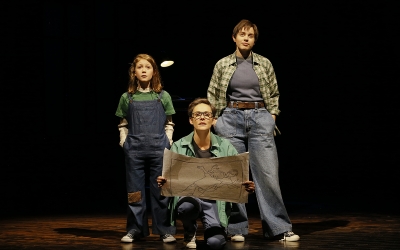Alison Bechdel
Vladimir Nabokov, in his exquisite autobiographical work Speak, Memory (1967), says that ‘the prison of time is spherical and without exits’. It is an idea that animates Jeanine Tesori and Lisa Kron’s musical adaptation of Alison Bechdel’s graphic novel Fun Home (2006), moving as it does in circular motions, enfolding its characters in an endless orbital spin through the years. Perhaps memory itself is like this, forever returning to our consciousness the painful and joyous things we’d thought we’d left behind, like moons in retrograde. It is no accident that the show’s opening number is titled ‘It All Comes Back’.
... (read more)What distinguishes graphic novels (aka ‘big fat comic books’) from other books is how completely the page registers movements of the maker’s hand. Before we begin the business of reading, we look, and what we see is not margin-to-margin Helvetica or Times New Roman: it’s the mark of the makers, be it Alison Bechdel or Kristen Radtke or Mandy Ord. We might even think of the making of comic books as being closer to letter writing than novel writing. Accustoming ourselves to the style of a particular graphic novelist (‘Aha! That’s how Bechdel depicts euphoria!’) is a large part of the pleasure of reading comics – the business of aligning one’s own visual point of view with the maker’s. Perhaps this is why autobiographical works have been such a vital force behind the rebirth of comic books as ‘graphic novels’.
... (read more)
